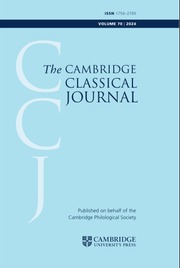Article contents
The demos in Greek tragedy*
Published online by Cambridge University Press: 23 January 2012
Extract
This paper looks at a relatively neglected character in Greek tragedy: the people. I cannot claim to produce a complete survey of this issue; however, I shall identify some different ways in which a tragic poet could portray a city's population, and discuss some examples.
This is an important and interesting topic for two reasons, which are linked throughout, for behind my argument is the contention that a consideration of the original staging of a tragedy can help us to understand its politics. In the first place, it is instructive to ask how a poet could meet the challenge of representing the population of a city on stage; in the second, this exercise is likely to shed light on the political function of Greek tragedy. More specifically, it will shed light on the relationship between tragedy and democracy - a vexed question in recent years - for no consideration of democracy in drama can neglect the role of democracy's central player.
- Type
- Research Article
- Information
- Copyright
- Copyright © The Author(s). Published online by Cambridge University Press 2010
References
WORKS CITED
- 4
- Cited by


